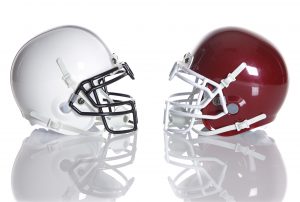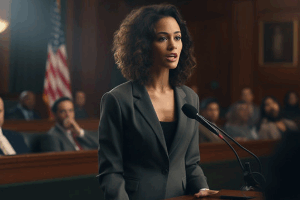 In honor of the Super Bowl, I went looking for a football-related IP story for this week’s column. As much as I dislike the team from Washington with the offensive name, I do not have much more to add on that particular trademark saga. At the same time, I have always been interested in technological improvements that can help make football a safer game to play, considering the well-documented risks of the game’s violent collisions to players of all ages. Perhaps the area of most focus lately has been in the area of brain injuries, which have unfortunately stricken the lives of many former players, and have led to serious questions about the long-term viability of the game. When the parents of the next generation of players have to weigh the odds of subjecting their progeny to a lifetime of neurological issues in exchange for the short-term thrill of competition and team camaraderie, there are doubtless going to be significant numbers who elect to steer their children to less dangerous sports.
In honor of the Super Bowl, I went looking for a football-related IP story for this week’s column. As much as I dislike the team from Washington with the offensive name, I do not have much more to add on that particular trademark saga. At the same time, I have always been interested in technological improvements that can help make football a safer game to play, considering the well-documented risks of the game’s violent collisions to players of all ages. Perhaps the area of most focus lately has been in the area of brain injuries, which have unfortunately stricken the lives of many former players, and have led to serious questions about the long-term viability of the game. When the parents of the next generation of players have to weigh the odds of subjecting their progeny to a lifetime of neurological issues in exchange for the short-term thrill of competition and team camaraderie, there are doubtless going to be significant numbers who elect to steer their children to less dangerous sports.
Fortunately, the rising awareness of brain trauma risk has led to a sustained period of innovation when it comes to player protection. From mouthguards to early instruction in proper tackling technique, football leagues at all levels are more focused than ever on reducing the risk of concussions and other injuries on the playing field. Most importantly, the single most important piece of safety equipment for football players — helmets (putting aside for a second the argument that forcing players to do without them will lead to even fewer injuries) — have improved tremendously over the years from an efficacy perspective. Innovations such as vent openings, dual-layer shells with energy-absorption, and the use of shock absorbing materials have all led to better helmets for players of all ages.
Because every player needs a helmet, helmet manufacturers have a steady stream of customers. At the same time, once a player chooses a helmet brand, it can be very difficult to get them to change, making it very difficult for companies to capture market share from competitors. Touting new safety features, however, can be a great entry point for seizing additional market share, putting a premium on helmet manufacturers continuing efforts to innovate and market their innovations. Not surprisingly, patents on helmet innovations are par for the course, just as you would expect for any expensive product whose sales are driven by touting incremental feature improvements.
In light of their value, it is unsurprising that football helmet patents have recently become the subject of some hard-fought litigation. Two of the leading helmet manufacturers, long-time leader Riddell and upstart Schutt, are currently embroiled in a set of patent cases, with each side accusing each other’s top-selling helmets of infringing homegrown patents. As with any competitor litigation, these cases have already seen each side take aggressive positions, including on some current hot button legal issues such as patent venue. For example, in a case that Schutt’s IP holding company filed against Riddell in the Eastern District of Texas — still a patentee’s favorite forum in many circles — the vast majority of the complaint’s contents centered around proving that the case was properly venued in East Texas. In fact, pgs. 3-26 of the less than 40-page complaint are dedicated to venue allegations, telegraphing in no uncertain terms how critical keeping the case in East Texas was to Schutt.
Riddell was undeterred by Schutt’s comprehensive litany of venue allegations, however, and promptly filed a motion to dismiss for improper venue, or to transfer on convenience grounds. In an interesting opinion that carried the football theme forward by quoting “Friday Night Lights,” the East Texas District Court judge actually found that venue was proper post-TC Heartland, even though Riddell was incorporated in Illinois and had no physical location in East Texas. Why? Because Riddell’s network of independent sales representatives made Riddell’s presence in East Texas as permanent as if the company had leased a storefront in downtown Tyler or Marshall. But because Riddell’s key technical employees and knowledge were in Illinois, the court transferred the case there on convenience grounds, especially since Schutt’s own ties to Texas were slight.
Ultimately, this early venue exchange in one of the Schutt/Riddell helmet patent cases shows how intense competitor patent battles can be, particularly in zero-sum sales markets. It also shows the lengths some companies will still go to in the hopes of securing a favorable forum for their dispute. At the same time, those who celebrate the role of the patent system in fostering competition and innovation can find much that is heartening with respect to the safety improvements today’s helmets have over their predecessors. It remains unclear whether we are heading for a future where the public demands a return to helmetless football, in the hopes of reducing violent collisions and player injuries. Until that day comes, helmet manufacturers will play an important role in increasing player safety through improved product offerings. We can at least hope that their patent fights don’t hamper the progress they are making, and rather spur them to continue innovating in the hopes of outpacing each other.
Finally, it is hard to resist a word about the Eagles’ Super Bowl win. My dad came here from France as a teenager, and never lost his continental sense that football is a game where the ball is kicked around, and perhaps headed on occasion. So as a child, I was free to choose my favorite (American) football team without any familial baggage. I gravitated to the fierce defense and free-wheeling offense of the late-1980s Buddy Ryan-led Eagles years, and stayed loyal in the face of a seemingly endless run of Super Bowl wins by the Cowboys, Redskins, and my hometown Giants. Through it all, my love for the Eagles was cemented by occasional road trips to see them play live, and the bittersweet Andy Reid years where the team returned every other year to the NFC championship for a decade, only to fall in their 2004 Super Bowl appearance — their only Super Bowl appearance of that era. My oldest son was a few months old that game, and I was an overworked but content associate, happy to have had the chance to even watch that game. In 2013, I was fortunate enough to secure season tickets, and even more fortunate to become an Eagles Season Ticket Board Member a few years later. For the past few years, I have enjoyed live games with each of my kids, and while this year seemed particularly exciting because of the development of Carson Wentz, I had no expectation of winning a Super Bowl. To see it happen, surrounded by my family, knowing as I do the many good people in the organization who work so hard to make sure the fans have a good experience and can be proud of their team was a (nerve-wracking) joy. To see this group of players embrace the role of underdogs — without losing their belief in their coaches or each other — made things even sweeter. To know that an entire city and fan base now has shared an experience that no one can ever take away from us is the greatest. This team lived by the the creed, “We all we got, we all we need.” We can only hope that we can share that same feeling of belonging and purpose with our families and colleagues. Fly Eagles Fly.
Please feel free to send comments or questions to me at [email protected] or via Twitter: @gkroub. Any topic suggestions or thoughts are most welcome.
Gaston Kroub lives in Brooklyn and is a founding partner of Kroub, Silbersher & Kolmykov PLLC, an intellectual property litigation boutique, and Markman Advisors LLC, a leading consultancy on patent issues for the investment community. Gaston’s practice focuses on intellectual property litigation and related counseling, with a strong focus on patent matters. You can reach him at [email protected] or follow him on Twitter: @gkroub.

